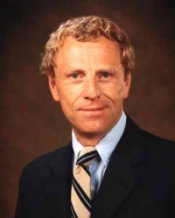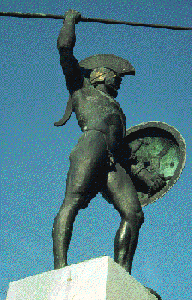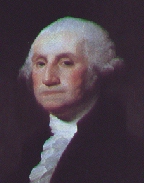| |

Though much is taken, much abides
and though
We are not now that strength which in old days
Moved earth and heaven, what we are, we are;
One equal temper of heroic hearts
Made weak by time and fate, but strong in will
To strive, to seek, to find, and not to yield.
Alfred, Lord Tennyson (1809-1892)
Ulysses
What is a Hero?
Is a the man who wins a war a hero? The athlete that
scores the tie-breaking goal? The inventor of a wonderful
tool? The woman who sacrifices every day to raise her
children? The banker who brings in that big account? What
about the person who bombs a crowded market?
Each of these sorts of people have been called heroes.
Can we really use the same label for Albert Schweitzer
and Arnold Schwarzeneggar? What meaning, then, does the
word really have?
There is a common thread running through all of these
people. It is the fact that they are role-models. This is
neither good nor evil. Both Gandhi and Hitler have been
heroes to someone. What matters is why we choose
the heroes we do. Personally, my heroes are either people
who have been willing to sacrifice themselves for a
higher cause or those who have achieved great things
despite enormous obstacles. As in Ulysses, it is
those who strive, and do not yield.
Examine a person's heroes, and you will begin to see
that person as he or she would like to see themselves.
Here then, are some of my heroes.

Edward Bushell
Bushell is a minor character in history, and is
included for exactly that reason. He was an ordinary man
whose dedication to an ideal marks a great turning point
in human justice. In 1670, Bushell was jury foreman at
the sedition trial of William Penn in London. Penn, who
later went on to found the American colony of
Pennsylvania, was on trial for being a Quaker and
speaking publicly. No evidence was introduced at the
trial regarding the content of Penn's speech, but a great
deal of emphasis was placed on the fact that the King had
taken a personal interest in the trial and wanted Penn
condemned.
It took Bushell and the jury less than fifteen minutes
of deliberation to return a verdict of Not Guilty
(actually, the verdict merely said that Penn was guilty
of speaking to an assembly - not a crime even then). The
presiding judge was apoplectic. He ordered the jury back
into deliberations and fined them all forty marks (about
two years' wages). When they again returned the same
verdict, he threatened to have Bushell's nose cut off for
defying the King. He said "Gentlemen,
you shall not be dismissed till we have a verdict the
court will accept; and you shall be locked up without
meat, drink, fire and tobacco. You shall not think thus
to abuse the court; we will have a verdict, or by the
help of God, you shall starve for it."
The entire jury spent several nights in London's
infamous Newgate prison, but uniformly refused to return
a verdict of Guilty. When the judge demanded to know when
Bushell would change his mind the answer he received was
unequivocal. "Never,"
replied Bushell. Eventually, Penn was set free and the
jury imprisoned. Bushell spent several weeks in one of
the worst prisons in England. On appeal, England's Chief
Justice, Justice Vaughn, affirmed that a jury must be
free to speak its conscience and cannot be fined for it's
verdict. Bushell's case, 84 Eng. Rep. 1123; 6 State
Trials 999 (C.P. 1670).
The courage of Edward Bushell and his fellow jurors
established for all time the independence of juries in
the Common Law nations. The most cherished part of our
legal system was given weight and validity by sixteen
common men possessed of an uncommon courage. And at their
head was Edward Bushell.

CDR Ernest Evans, USN
The United States, and a few other nations around the
world, have in their midst a whole group of heroes whose
labor on behalf of their nation is done at sea, cut off
from their families, their homes and the reassuring sight
of land. All too often, we forget their endless watch on
the seas.
Commander Evans exemplifies the best in martial
service. Ernest "Chief" Evans, a naval academy
graduate of Cherokee indian descent was the commanding
officer of the destroyer USS Johnston on 25
October 1944, when that ship was part of the task force
known as "Taffy III" patrolling off Samar
island in the Phillipines. Taffy III was a tiny
rearguard, protecting General MacArthur's troops as they
landed on Leyte.
VADM Sprague, Taffy III's commander, thought that ADM
Halsey's Task Force 34 was guarding the San Bernardino
strait, when in fact Halsey had moved north to challenge
Japanese VADM Ozawa's Northern Force, a decoy. The bulk
of the Japanese fleet, under VADM Kurita, was bearing
down on Taffy III, prepared to rip it to shreds. Taffy
III consisted of six tiny escort carriers, three
destroyers and four small destroyer escorts. Kurita's
Center Force consisted of four battleships, seven
cruisers and eleven destroyers. Taffy III was hopelessly
outgunned.
Johnston, the closest American ship to the
Japanese fleet, turned toward it and charged, followed by
USS Hoel and USS Roberts. The closing
speed between the Johnston and the attack
cruiser CA Kumano was more than 60 knots. Johnston's
small guns had less than half the range of Kumano's,
not to mention the mammoth guns of the battleships. Johnston
put ten torpedoes into Kumano, then reversed
course and continued to run the gauntlet of one of the
most powerful fleets ever assembled. She was torn apart
by heavy 14-inch and 6-inch shells. She lost her fire
control, her compass, her radio and all but one engine.
Yet over the course of the next three hours, Evans and Johnston's
crew repeatedly steamed between the mighty fleet and the
vulnerable escort carriers.
Evans himself was repeatedly wounded, but refused to
leave the bridge or take his ship out of the fight. His
shirt was blown off his body by an explosion on the
bridge. Half of his left hand was torn off. But he and
his heroic crew continued to make attack runs on the
Japanese fleet. Johnston was finally cornered
and sunk at 1010 in the morning, three and a half hours
after she first charged the Kumano. The flagship
of Japanese Destroyer Squadron 10, which had riddled her
with 5-inch shells, fired a salute as she went down.
The Japanese commander, VADM Kurita, unaware of the
completeness of his victory, was convinced that he'd just
tangled with the screening force of Halsey's Task Force
34, and retreated back the way they'd come. If not for
the courage and determination of CDR Evans, his crew and
the men of Taffy III, the vulnerable escort carriers
would have been destroyed, and MacArthur's landing force
annihiliated. 1,130 members of Taffy III died in what
would eventually be known as the Battle of Leyte Gulf. Of
327 crewman aboard USS Johnston, only 141
survived.


Morris Dees
 Morris
Dees is America's foremost crusader against hate crimes.
He co-founded the Southern Poverty Law Center, a
nonprofit group of lawyers that specializes in
civil-rights violations and racially motivated crimes.
The center exposes and undermines American hate groups,
ranging from the Ku Klux Klan to anti-government
militias. Morris
Dees is America's foremost crusader against hate crimes.
He co-founded the Southern Poverty Law Center, a
nonprofit group of lawyers that specializes in
civil-rights violations and racially motivated crimes.
The center exposes and undermines American hate groups,
ranging from the Ku Klux Klan to anti-government
militias.
In 1981, when Klan members lynched a black man in
Mobile, Dees and the Southern Poverty Law Center sued the
Klan for inciting violence and won a $7-million judgment.
The importance of this victory cannot be overstated. The
precedent was established that criminals cannot hide
behind organizations. Membership in groups that espouse
and encourage crime makes the member liable for damages
caused.
Dees also successfully prosecuted and won a
$12-million judgment against Tom Metzger, racist leader
of the hate group known as "White Aryan
Resistance". Metzger had encouraged some skinheads
in Portland, Oregon to "defend the Aryan race"
by violence. Later that day, when Metzger was far away,
the young men beat and stomped an innocent Ethiopian man
named Mulugeta Seraw, to death.
Dees established Metzger as the proximate cause of the
crime and make him accountable. In these two cases, Dees
was able to attribute the murders to the hateful beliefs
of a larger organization, thus "holding accountable
once and for all" groups that advocate violence as a
means for advancing their ideas, he said.
Dees' life has been threatened on many occasions, and
the vicious hate group known as "The Order"
actually planned to kidnap and torture him prior to their
capture by the authorities. Yet he continues to crusade
against hatred, racial injustice and the abuse of the
desperately poor. He denies any status as a hero, but his
quiet determination that evil will not go unremarked or
unchallenged marks Morris Dees as a great man, and is
what makes him one of my heroes.

Leonidas
"Stranger, announce to the
Spartans that we
lie here dead, obedient to their words"
-Herodotus
 Another
characteristic of heroism is that it can be found
anywhere. Leonidas was the king of Sparta (Lacedaemon)
who commanded the Greek armies at one of the most
important battles in human history: Thermopylae. In 489
B.C., the Persians (known to the Greeks as the Medes) had
invaded Greece in overwhelming numbers. The Greek
city-states were trying to assemble their armies at the
plain of Marathon, and Leonidas took a tiny force of 300
Spartans and Thespians to the narrow mountain pass
through which the Persians would have to pass to reach
Marathon. The Persians numbered more than an hundred
thousand. Another
characteristic of heroism is that it can be found
anywhere. Leonidas was the king of Sparta (Lacedaemon)
who commanded the Greek armies at one of the most
important battles in human history: Thermopylae. In 489
B.C., the Persians (known to the Greeks as the Medes) had
invaded Greece in overwhelming numbers. The Greek
city-states were trying to assemble their armies at the
plain of Marathon, and Leonidas took a tiny force of 300
Spartans and Thespians to the narrow mountain pass
through which the Persians would have to pass to reach
Marathon. The Persians numbered more than an hundred
thousand.
Thermopylae was important because Persia
was the world's first true superpower. It dominated Asia
and sought to dominate Europe. If the Greeks had lost at
Marathon, Western civilization would have died at birth.
And the Greeks could not have won at Marathon without the
brave stand of the Spartans at Thermopylae.
To call what the Spartans did at
Thermopylae 'brave' is to misunderstand the scale of the
action. Thousands of Persian soldiers, including the very
best, the 'Immortals', tried repeatedly to destroy the
tiny force that blocked their way. Every Greek soldier
was outnumbered more than ten to one in each clash. They
knew, with an absolute certainty, that not one of them
would survive the battle, and yet they kept the mighty
Persian army at bay for a critical six days.
Leonidas and his men knew what was at
stake, and knew that every hour they bought for the army
assembling at Marathon was just that much more chance
that the Greeks could defeat the Persian juggernaut
before them. Many men have risked death for their
countries, but these men took no risk: death was a
certainty. Yet even though the way to flee was clear
behind them, they held the pass to the last man, even
launching a series of daring charges to recover the body
of Leonidas once he had died, for he stood in the front
rank throughout the fighting.
People need not be soldiers to be heroes,
and it is the spirit of the Spartans that made them
heroic, not their victories. Indeed, it was in defeat
that they showed their truest selves. Some of us, at one
time in our lives or another, will have to make the
choice to either give up our principles or give up
everything else that is dear to us. That choice, though
devastating, holds a terrible beauty: the chance to know
who and what we really are.
THERMOPYLAE
Honor to those who in the life they
lead
define and guard a Thermopylae.
Never betraying what is right,
consistent and just in all they do
but showing pity also, and compassion;
generous when they're rich, and when they're poor,
still generous in small ways,
still helping as much as they can;
always speaking the truth,
yet without hating those who lie.
And even more honor is due to them
when they foresee (as many do foresee)
that Ephialtis will turn up in the end,
that the Medes will break through after all.
C. P. Cavafy (1903)

George Washington
First in War, First in Peace,
First in the hearts of his Countrymen.
The first popularly elected head of state in more than
twenty-three centuries, George Washington has had an
enormous amount of praise and adulation from the nation
that calls him 'the father of his country." He is
more symbol than man, now. We tell our children that he
never told a lie, and that he starved with his men at
Valley Forge, even though we know these things to be
untrue.
It is right an fitting that any nation find for itself
heroes, or make them. Symbols are in many ways far more
important than the actual people underlying the legends.
For instance, it doesn't really matter whether King
Arthur ever existed: his power as a symbol far outweighs
any importance he might have had as an historical figure.
But when our national heroes are modern men, whose lives
can be examined, we all too often find them lacking; our
symbols become soiled with reality.
George Washington is a remarkable and notable
exception. The United States was blessed at her birth by
having not one leading figure, but a whole host of great
men, what one historian calls 'that galaxy of demigods'.
Jefferson, Madison, Mason, Henry, Adams, Hamilton,
Franklin, Jay...the list is a very long one. But the
interests and views of these Founding Fathers were never
less than fractious, always at odds. And it is here that
Washington's greatest asset showed through. Not his
martial ability, nor his keen intelligence, but his
complete and utter moral integrity. Members of both
parties (Federalist and Anti-Federalist) trusted
implicitly that Washington would remain impartial and so
he was the only one they would trust as President of the
Congress, and later, of the United States.
Unlike modern politicians, Washington sought no fame
or limelight. Rather he turned his talents on those
things he felt were his duty, and did them quietly and
with energy and diligence. On one famous instance where
he did act decisively to preserve the nation, he did so,
characteristically, by personally appealing to the better
natures of his men. In that case, the Continental Army,
furious over not having been paid in years, assembled to
vote on a motion to march out of the country, leaving it
defenseless. Washington went among them at their angriest
and took the podium to speak. But in the dim light, he
could not read the words he had written down. So the
crowd of soldiers waited while he found his spectacles.
"Forgive me",
he said. "I have grown
old in the service of my country." So
shamed were the angry soldiers at seeing this, that they
crowded and clamored about him, ending the meeting.
Washington later forced Congress to pay the Army some of
what they were owed.
During his life, Washington was many things: Surveyor,
Farmer, Businessman, Soldier, and Statesman. The United
States might well not exist if not for Washington's
military ability, but it was his personal moral
integrity, so great that it was felt without question by
'that galaxy of demigods', that brought respect and faith
to the Presidency. Men were willing to believe that a
single man could lead without trying to rule, that great
power does not necessarily corrupt the man who wields it.

 Visit the "My Hero"
Website Visit the "My Hero"
Website
 Back to Scott's Home Page Back to Scott's Home Page
This Page Copyrighted 1997-8 by Scott
C. Nolan
|